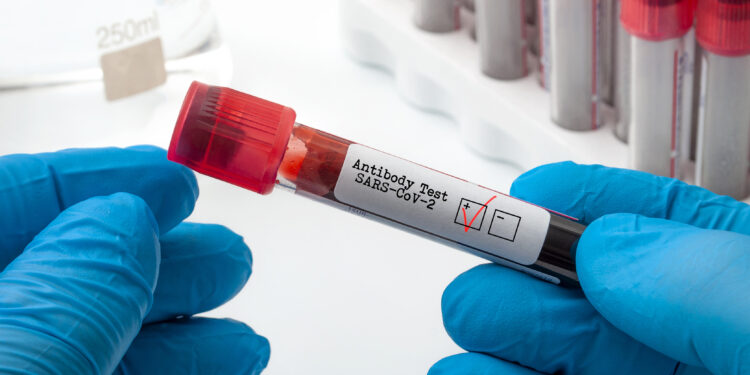Study: Extremely low SARS-CoV-2-Rate, Blood-giving
With the Coronavirus SARS-CoV-2 infected people develop in the course of the disease after a few days to weeks, antibodies against characteristics of the pathogen. In a study of how many “silent” infections with the novel Virus, i.e. infection without symptoms, there has been a Blood donor has now been investigated.

Many of the Coronavirus Patients show no symptoms. You can transfer the pathogen, therefore, unwittingly to other people and thus represent a high risk. The number of “silent” carriers could, according to researchers worldwide in the millions. Now there are new findings about how high this number could in this country.
Less than one percent of antibodies were detected
According to a recent communication from scientists at the University hospital Hamburg-Eppendorf (UKE) in April, may and June, more than 900 anonymised samples from blood donors and blood donors are tested for antibodies to a picture of the “silent” infections with the SARS-CoV-2-make pathogens to.
Less than one percent of the tested blood antibodies have been detected in donations against the novel Coronavirus.
The Hamburg authority for health and consumer protection, had brought the investigation together with the UKE on the way.
Continue to Hygiene and distance to keep the commandments
“While the PCR Tests for the detection of infection represent only a snapshot, can be detected with antibody tests, whether a person has developed immunity against the SARS-CoV-2,” explains Cornelia Prüfer-Storcks, Senator of the authority for health and consumer protection.
“For the width of the population, it can be determined whether there is sufficient immunity to stop the Spread capabilities of the Virus. The first results of the study show us that this is apparently the case, even if a further test run of“ the Senator.
“As long as there is no evidence of a pre-existing immunity among the population, or an approved vaccine, it is still important to maintain Hygiene and distance of the commandments, the spread of the Virus isolate.”
Unnoticed Infection Gradients
People who suffer from COVID-19, develop in the course of the disease after a few days to weeks, antibodies against characteristics of the Virus.
How many “silent” infections with the SARS-CoV-2-Coronavirus, i.e. infection without symptoms, it has been among the blood donors and blood donors in the UKE in the last three months, under Dr. Sven Peine, Director of the Institute for transfusion medicine, together with Dr. Marc Lütgehetmann, Institute for Medical Microbiology, Virology and Hygiene, was looking at a total of 914 blood samples.
In the period of 6. to 10. April was at 300 blood donation, only a previously unknown SARS-CoV be detected-2 infection serologically (0.3 per cent), in the period from the 4. to 6. In may, there were at 288 blood donation, two previously unknown SARS-CoV-2 infections (0.7 per cent) and in the period from 2. to 5. June, at 326 blood donation, only a previously unknown SARS-CoV-2 infection (0.3 per cent) is again.
“Blood donors and blood donors are not a 1:1 Image of the people of Hamburg, but you can give us a good indication of the unrecognized infection histories,” says Dr. Sven Peine.
The expert adds: “anyone Who was here in Hamburg in the last months of only mild or non-specific cold symptoms, was also ill with a very high probability of COVID-19.”
Routine testing of all blood donations in Germany
According to the figures available for the study in the first step until the middle of April, so-called back-tested samples from 300 blood donors, and blood donors from the year 2017 on the Presence of antibodies against the novel Coronavirus.
It was because of this that could have been infected in the year 2017, yet none of the blood donors in Hamburg with the novel Virus, were used in these studies on the Review of four different antibody tests (from the company DiaSorin, euroimmun, Roche and Wantai).
All of these Tests showed that the blood donation is a good analytical specificity with only a very small number of false positive results.
In the second step, was then selected on the basis of the results, a suitable anti-body test, to in the blood the antibodies. As the communication explains, is given to the blood sample in the laboratory in a test vessel with components of the virus (antigens).
Antibodies should be against the novel Coronavirus present, bind to the antigens and can be made with a fluorescence agent is visible.
Due to the high sensitivity was used for the further study of the Roche antibody test (this was only a false positive result in 319 samples).
In a third step, then, in April 300, in may, 288 and in June 326 anonymised blood donor samples for the presence of antibodies against SARS-CoV-2 investigated.
The result of the Screening showed that the SARS-CoV-2-the Rate of a total of 914 Blood donors was below one percent.
According to the current state of the science, and also according to the Paul-Ehrlich-Institute a routine is donate standard testing of all blood in Germany is not necessary, since only very few and then only hard wearing fell ill with the virus in the blood and, as such, not as a blood-giving may come into question.
According to the experts, the Study should be repeated to continue in a four-week interval. (ad)
